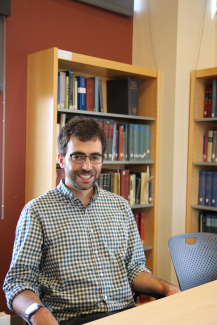Adam Kaufman — a JILA Fellow, NIST (National Institute of Standards and Technology) Physicist, and University of Colorado Boulder Professor — has been awarded the American Physical Society's (APS) 2023 I.I. Rabi Prize in Atomic, Molecular, and Optical (AMO) physics. “I was surprised when I was notified and feel extremely honored” Kaufman stated. This prize, awarded in odd-numbered years, recognizes influential early-career research in the fields of AMO physics. Along with $10,000 dollars in prize money, recipients receive a certificate citing their contributions. The recipient will receive the prize at a ceremony at the next DAMOP conference in Spring, 2023. “My group has focused on developing tools to control arrays of alkaline-earth atoms at a single-particle level,” Kaufman said about his work. “We have translated these new tools to quantum science applications in metrology, quantum information, and intersections between the two.” Kaufman’s groundbreaking work using optical tweezers and other tools to study interactions at the quantum level was cited in the prize letter from APS. Several JILA Fellows have been awarded this prize in the past, including Eric Cornell, Deborah Jin, and Jun Ye.
You can find out more about the prize here.
Written by Kenna Hughes-Castleberry, JILA science Communicator



 The Physics Frontiers Centers (PFC) program supports university-based centers and institutes where the collective efforts of a larger group of individuals can enable transformational advances in the most promising research areas. The program is designed to foster major breakthroughs at the intellectual frontiers of physics by providing needed resources such as combinations of talents, skills, disciplines, and/or specialized infrastructure, not usually available to individual investigators or small groups, in an environment in which the collective efforts of the larger group can be shown to be seminal to promoting significant progress in the science and the education of students. PFCs also include creative, substantive activities aimed at enhancing education, broadening participation of traditionally underrepresented groups, and outreach to the scientific community and general public.
The Physics Frontiers Centers (PFC) program supports university-based centers and institutes where the collective efforts of a larger group of individuals can enable transformational advances in the most promising research areas. The program is designed to foster major breakthroughs at the intellectual frontiers of physics by providing needed resources such as combinations of talents, skills, disciplines, and/or specialized infrastructure, not usually available to individual investigators or small groups, in an environment in which the collective efforts of the larger group can be shown to be seminal to promoting significant progress in the science and the education of students. PFCs also include creative, substantive activities aimed at enhancing education, broadening participation of traditionally underrepresented groups, and outreach to the scientific community and general public.